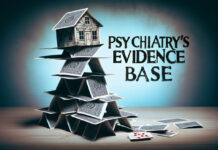A new meta-analysis of modern trials of lithium found no evidence that the drug prevents suicide or non-fatal suicidal behaviors. The study included 12 randomized controlled trials (RCTs) comparing lithium to placebo or usual care for mood disorders, encompassing 2578 participants. The researchers found that the difference between lithium and placebo for all suicide-related outcomes was not statistically significant.
The study was led by Joanna Moncrieff at University College London, who recently garnered media attention for a review that debunked the low serotonin (“chemical imbalance”) theory of depression.
Reached for comment via email, Moncrieff said:
“The idea that lithium prevents suicide has added to its mystique and helped propagate the idea that lithium is a highly specific and effective treatment. But it never made any sense. Lithium is a highly toxic, sedative substance. It dulls emotions, which might reduce suicidal thoughts, but we know that many psychiatric drugs have this emotion-dulling effect and yet do not reduce suicidal behavior.”
 Previous studies have come to inconsistent conclusions about lithium’s supposed anti-suicidal properties. For instance, a large, recent RCT of lithium for suicide prevention in veterans was terminated early because the drug was found to be no better than a placebo. However, other analyses have found lithium to be slightly better than a placebo.
Previous studies have come to inconsistent conclusions about lithium’s supposed anti-suicidal properties. For instance, a large, recent RCT of lithium for suicide prevention in veterans was terminated early because the drug was found to be no better than a placebo. However, other analyses have found lithium to be slightly better than a placebo.
Because of this, even some experts who acknowledge the poor evidence base for almost all psychiatric drugs—such as Nassir Ghaemi—believe that lithium has a stronger evidence base. Some have even called for adding lithium to drinking water.
According to the current researchers, one reason for the inconsistent findings is that previous meta-analyses used the Peto method. In the Peto method, studies in which deaths by suicide don’t occur are thrown out—only studies in which the event occurs are analyzed.
The researchers write, “Since suicide is so rare, many trials with relevant data have not been included in these analyses, which may have inflated treatment effects.”
Another related issue is that, since so few people die by suicide, the results can be skewed by a single trial with poor methodology. The researchers write that previous meta-analyses may have been skewed by just such a trial: a study by Lauterbach et al. in which the blind was broken, many participants did not adhere to treatment, and the lithium group received extra care.
In contrast, the current study used the data from all of the relevant trials of lithium for mood disorders (including depression and bipolar disorder) in adults since the year 2000. The researchers only included studies that lasted at least 12 weeks since short-term studies tend to artificially inflate treatment effects. The researchers followed PRISMA guidelines for conducting a systematic review and pre-specified their outcome measures.
“A previous meta-analysis of lithium trials claimed to confirm that it had anti-suicidal properties, and it was very influential, but it only included trials in which there was a suicide, excluding the majority of trials in which none occurred. Therefore we wanted to perform an analysis that included all the data from randomized trials. We showed that if you did this, the claim that lithium reduces suicide is quite fanciful and not borne out by the evidence from randomised trials,” Moncrieff said.
Out of the 2578 participants, two died by suicide in the lithium group (0.2%), while five died by suicide in the placebo or usual care group (0.4%). This difference was not statistically significant, meaning that a difference like this is what would be expected just by chance, given such small numbers.
Only seven trials included the outcome of non-fatal suicidal behavior. Out of the 1975 participants in those trials, 81 (6.3%) in the lithium group versus 85 (6.5%) in the placebo group engaged in non-fatal suicidal behavior. Again, this difference was not statistically significant.
It’s not just the modern studies, either—in an additional analysis, the researchers included 15 other studies from before 2000. Their results were unchanged—the drug remained no better than the placebo.
To see if this finding was due to the specific type of analysis used, the researchers re-analyzed their data using other meta-analytic methods. All of these tests found no difference between lithium and placebo.
“The idea that lithium helps prevent suicide really should be put to bed now. The latest, and by far the largest, trial of its anti-suicidal effects was even stopped early because it was so obvious there was no effect. Yet some psychiatrists are so enamored with lithium it will probably persist. Shockingly, some are still calling for lithium to be added to drinking water and using arguments about its anti-suicidal properties as justification – God forbid that they ever prevail!” Moncrieff said.
****
Nabi, Z., Stansfeld, J., Plöderl, M., Wood, L., & Moncrieff, J. (2022). Effects of lithium on suicide and suicidal behavior: A systematic review and meta-analysis of randomized trials. Epidemiology and Psychiatric Sciences, 31(e65), 1–11. https:// doi.org/10.1017/S204579602200049X (Full text)















Someone told me that Lithium made them more depressed then prior to taking anything. He said the side effects we’re horrible for him.
Report comment
Sorry to hear that, Rik.
Someone I knew once said to me that life was a continual perhaps even worsening disappointment and that they were finding it increasingly problematic to mix with optimistic people. They said that their difficulty engaging with the world was worsened, probably inconsolably, by the tendency of almost everyone to embrace lies of every possible sordid kind and make a kind of situational life-cult about it. I told them in so many words I had no idea what they were driving at. I was lying. I was too frightened to speak out, And that was the last nail in the coffin.
They died precisely 17 months ago of cirrhosis and complicating factors. I do respect the alcoholics that embrace drinking as a philosophical answer, and she was one of them. Others dead and gone to dust were drinking for the hell of it. The hell of it. I respect these people for their mostly conscious slow suicide, the most socially acceptable form of suicide, second only to patient waiting.
Camus wrote a whole book trying to find meaning in meaninglessness. It’s a dreadful failure, but at least he had a go of it. Then snuffed it.
Report comment
I have the impression that excluding people who are turned violent after consuming alcohol are for the most part more decent that the average person.
That somehow the excess or frequent alcohol consumption for a relevant chunk is a way to say no to participating in acts contrary to common decency.
Not an escape but a way of resistance to participate in harm to another.
But it’s my personal take, I haven’t read that, and goes against the grain that excess alcohol consumption is somehow genetic, or a personal weakness/failure. Hypotheses or explanations with which I always disagreed.
And sometimes is social and cultural. There is a group of natives in I think Peru or Bolivia that drink socialy pure alcohol every weekend, in excess and apparently there is not a corresponding liver failure increase in them.
I am not peddling alcohol consumption in any form though.
Report comment
Then beyond the finding of no real diminution in suicidal behaviour there is the not repeated enough fact that the unpublished studies probably either found no difference or a worsening of suicidal behaviour after lithium.
And because of that reason were not published and are therefore not part of this new meta-analysis.
Which to me would suggest that if even now it is a strong finding that lithium has no effect on suicidality in this population, the unpublished evidence if it were published probably would be even stronger.
Unless a researcher with conflicts of interest gets involved in publishing some form of that, from like a national database, a big insurer, a big medication management provider, etc.
It is a negative finding after all, and those tend not to be published. I imagine particularly when are contrary to established practice or belief.
Report comment